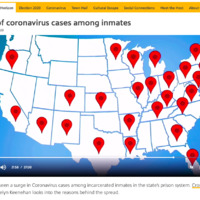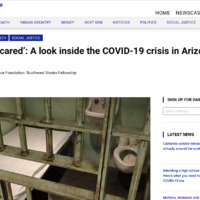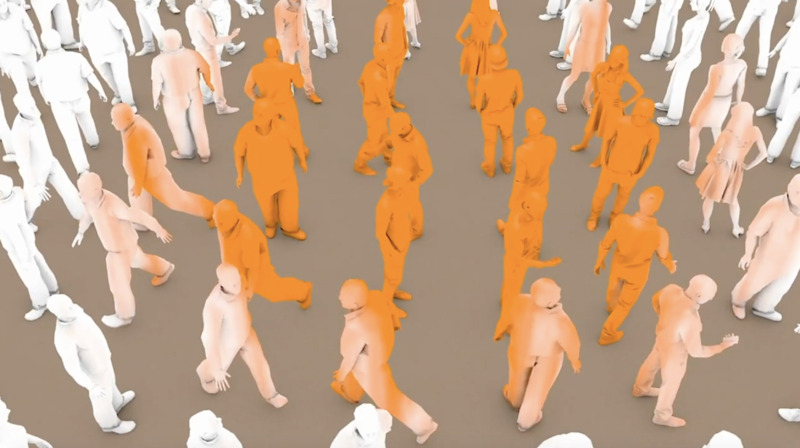Item
‘They’re scared’: A look inside the COVID-19 crisis in Arizona prisons.
Media
Title (Dublin Core)
‘They’re scared’: A look inside the COVID-19 crisis in Arizona prisons.
Description (Dublin Core)
By Katelyn Keenehan | Luce Foundation: Southwest Stories Fellowship
.
As COVID-19 began to spread across the Southwest in March, lawyers representing incarcerated Arizonans reported “unsanitary conditions,” “inadequate medical staffing and treatment” and a “failure to take strong and sensible precautionary measures” in state prisons.
The combination left prisoners “highly vulnerable to outbreaks,” the attorneys wrote in a letter to the state before asking a federal judge to intervene. COVID-19 can spread swiftly in crowded indoor spaces and among individuals with chronic health problems.
More than three months later, complaints of insufficient safety measures and subpar medical care continue to plague Arizona prisons.
And as hundreds of inmates and corrections officers test positive for the virus, justice reform advocates and others with ties to the correctional system worry the state is running out of time to prevent an even more dangerous surge in cases.
“(Inmates) are scared,” said Jared Wagoner, who was incarcerated in the Yuma prison’s Cibola Unit until June 8. He cited close quarters, insufficient testing and indifferent medical staff as ongoing obstacles.
“They’re scared that their two-year sentence is going to become a life sentence,” Wagoner said.
'WE COULD NEVER GET A STRAIGHT ANSWER'
Arizona has one of the highest incarceration rates in the country, with more than 40,000 people in prisons.
Yuma is among the worst prison complexes in the state terms of COVID-19 infections. As of early July, officials had tested more than 500 of the facility’s 4,700-plus prisoners for the virus, with nearly one in five testing positive.
“People had tested positive out of every single dorm on the yard,” Wagoner said. With prisoners sharing bathrooms and spaced just three feet from each other while in their cells, that meant nearly everyone had likely been exposed, he said.
The nearly 3,000-inmate Kingman complex, in Golden Valley, also experienced a smaller-scale COVID-19 outbreak. Five of 15 people tested for the virus came back positive in early July.
Deborah North, whose husband is incarcerated at Kingman, said family members had to piece together many of the details themselves, as they were mostly kept in the dark. The state Department of Corrections, Rehabilitation and Reentry also declined a media request for an interview.
“I am in a lot of Facebook groups with people that have relations inside Kingman,” North said. “If you don’t hear from your loved one even for a day, then the signal goes out, and everybody questions what is going on.”
North’s husband is 78, which puts him in the age group most vulnerable to the virus. Due to the tight living quarters and thin hallways, maintaining six feet of social distance is out of the question for him, she said. Six inches is more realistic as inmates line up to get food or medication.
For months, prisoners lacked access to a basic tool that could’ve mitigated infection risks in close quarters — masks — despite being put to work making face coverings for prison staff as early as April 7. Masks were not mandatory for staff until June 12, when ADCRR director David Shinn issued a notice requiring them on the complex premises.
Face coverings help block the respiratory droplets produced when an infected person coughs, sneezes or talks — the primary way the virus spreads, according to the U.S. Centers for Disease Control and Prevention.
At the Yuma complex, where Wagoner was incarcerated, “we asked the warden why we weren’t getting masks, and then the warden would tell us to address medical (staff),” he said. “Then, medical would tell us to ask the warden and we could never get a straight answer.”
At the Kingman complex, officials started providing three masks a week per inmate after prisoners began trading the few masks they had for other goods, according to North.
“I think they wanted to reduce how much they had become a commodity,” she said.
It wasn’t until June 29, after months of pressure from prisoners, their families and other advocates, that Gov. Doug Ducey announced all incarcerated Arizonans would have access to masks by the end of the week.
'NOBODY... HAS BEEN ABLE TO GET A TEST'
Testing access has proved to be another persistent problem.
Though corrections officials said via email that they “separate any inmates who exhibit flu-like symptoms from the general population for monitoring and appropriate follow-up care,” it’s not clear how severe a prisoner’s symptoms must be in order to be tested and separated from the general population.
In Yuma, inmates who reported symptoms were turned away without receiving a test, Wagoner said.
“All the medical (staff) told them was that they were dehydrated, and to go back to the dorm and drink water,” he said.
At the Kingman complex, “nobody in the runs (dorms) that my husband is near to has been able to get a test,” North said. “Not a single one.”
North’s husband has faced ongoing challenges when trying to receive medical care, she said, despite living in the complex’s medical unit. Prisoners have long alleged medical services in state prisons fall short: Despite settling a class-action lawsuit over the matter in 2014, the state has been fined millions for failing to comply with the terms outlined in the settlement.
“A lot of the medical staff treat them as subhuman ... and that was true before COVID,” North said.
The state also does not require infected corrections staff to report their COVID-19 status; however, it does allow them to self-report if they desire. The self-reported staff numbers can be found on the ADCRR COVID-19 dashboard.
PRECAUTIONS NOT EVENLY IMPLEMENTED, FAMILIES SAY
Throughout the pandemic, state corrections officials have insisted they’ve instituted several precautionary measures to protect inmates from the virus, such as suspending
visitation, halting inmate transfers to avoid cross-contamination, and providing bars of body soap upon request.
But prisoners and their families say the precautions have been implemented unevenly and irregularly.
At state-run facilities like Yuma, for instance, officials implemented one 15-minute video visit a week per inmate, in addition to two free phone calls. But at the Kingman complex, operated by GEO Group, video visits have never been an option.
Prisoners do receive soap, but the bars are the size of two quarters. Inmates are expected to use them to wash their hands, bunks and bathrooms.
When the American Friends Service Committee of Arizona, Arizona Attorneys for Criminal Justice and the Reframing Justice Project gathered masks, soaps, gloves, tampons, and other personal hygiene equipment for prisoners, the state would not accept them.
And though officials did temporarily stop transferring inmates from facility to facility — a strategy used to meet bed-occupancy contract requirements — it appears to have resumed transfers in recent weeks.
“We have done prison reform rallies by the Douglas facilities, and can see the buses pulling in full of people, ” North said.
At least 421 prisoners at 13 of the state’s 16 facilities have tested positive for COVID-19, according to the state, and at least 226 staffers have reported positive results.
The combination left prisoners “highly vulnerable to outbreaks,” the attorneys wrote in a letter to the state before asking a federal judge to intervene. COVID-19 can spread swiftly in crowded indoor spaces and among individuals with chronic health problems.
More than three months later, complaints of insufficient safety measures and subpar medical care continue to plague Arizona prisons.
And as hundreds of inmates and corrections officers test positive for the virus, justice reform advocates and others with ties to the correctional system worry the state is running out of time to prevent an even more dangerous surge in cases.
“(Inmates) are scared,” said Jared Wagoner, who was incarcerated in the Yuma prison’s Cibola Unit until June 8. He cited close quarters, insufficient testing and indifferent medical staff as ongoing obstacles.
“They’re scared that their two-year sentence is going to become a life sentence,” Wagoner said.
'WE COULD NEVER GET A STRAIGHT ANSWER'
Arizona has one of the highest incarceration rates in the country, with more than 40,000 people in prisons.
Yuma is among the worst prison complexes in the state terms of COVID-19 infections. As of early July, officials had tested more than 500 of the facility’s 4,700-plus prisoners for the virus, with nearly one in five testing positive.
“People had tested positive out of every single dorm on the yard,” Wagoner said. With prisoners sharing bathrooms and spaced just three feet from each other while in their cells, that meant nearly everyone had likely been exposed, he said.
The nearly 3,000-inmate Kingman complex, in Golden Valley, also experienced a smaller-scale COVID-19 outbreak. Five of 15 people tested for the virus came back positive in early July.
Deborah North, whose husband is incarcerated at Kingman, said family members had to piece together many of the details themselves, as they were mostly kept in the dark. The state Department of Corrections, Rehabilitation and Reentry also declined a media request for an interview.
“I am in a lot of Facebook groups with people that have relations inside Kingman,” North said. “If you don’t hear from your loved one even for a day, then the signal goes out, and everybody questions what is going on.”
North’s husband is 78, which puts him in the age group most vulnerable to the virus. Due to the tight living quarters and thin hallways, maintaining six feet of social distance is out of the question for him, she said. Six inches is more realistic as inmates line up to get food or medication.
For months, prisoners lacked access to a basic tool that could’ve mitigated infection risks in close quarters — masks — despite being put to work making face coverings for prison staff as early as April 7. Masks were not mandatory for staff until June 12, when ADCRR director David Shinn issued a notice requiring them on the complex premises.
Face coverings help block the respiratory droplets produced when an infected person coughs, sneezes or talks — the primary way the virus spreads, according to the U.S. Centers for Disease Control and Prevention.
At the Yuma complex, where Wagoner was incarcerated, “we asked the warden why we weren’t getting masks, and then the warden would tell us to address medical (staff),” he said. “Then, medical would tell us to ask the warden and we could never get a straight answer.”
At the Kingman complex, officials started providing three masks a week per inmate after prisoners began trading the few masks they had for other goods, according to North.
“I think they wanted to reduce how much they had become a commodity,” she said.
It wasn’t until June 29, after months of pressure from prisoners, their families and other advocates, that Gov. Doug Ducey announced all incarcerated Arizonans would have access to masks by the end of the week.
'NOBODY... HAS BEEN ABLE TO GET A TEST'
Testing access has proved to be another persistent problem.
Though corrections officials said via email that they “separate any inmates who exhibit flu-like symptoms from the general population for monitoring and appropriate follow-up care,” it’s not clear how severe a prisoner’s symptoms must be in order to be tested and separated from the general population.
In Yuma, inmates who reported symptoms were turned away without receiving a test, Wagoner said.
“All the medical (staff) told them was that they were dehydrated, and to go back to the dorm and drink water,” he said.
At the Kingman complex, “nobody in the runs (dorms) that my husband is near to has been able to get a test,” North said. “Not a single one.”
North’s husband has faced ongoing challenges when trying to receive medical care, she said, despite living in the complex’s medical unit. Prisoners have long alleged medical services in state prisons fall short: Despite settling a class-action lawsuit over the matter in 2014, the state has been fined millions for failing to comply with the terms outlined in the settlement.
“A lot of the medical staff treat them as subhuman ... and that was true before COVID,” North said.
The state also does not require infected corrections staff to report their COVID-19 status; however, it does allow them to self-report if they desire. The self-reported staff numbers can be found on the ADCRR COVID-19 dashboard.
PRECAUTIONS NOT EVENLY IMPLEMENTED, FAMILIES SAY
Throughout the pandemic, state corrections officials have insisted they’ve instituted several precautionary measures to protect inmates from the virus, such as suspending
visitation, halting inmate transfers to avoid cross-contamination, and providing bars of body soap upon request.
But prisoners and their families say the precautions have been implemented unevenly and irregularly.
At state-run facilities like Yuma, for instance, officials implemented one 15-minute video visit a week per inmate, in addition to two free phone calls. But at the Kingman complex, operated by GEO Group, video visits have never been an option.
Prisoners do receive soap, but the bars are the size of two quarters. Inmates are expected to use them to wash their hands, bunks and bathrooms.
When the American Friends Service Committee of Arizona, Arizona Attorneys for Criminal Justice and the Reframing Justice Project gathered masks, soaps, gloves, tampons, and other personal hygiene equipment for prisoners, the state would not accept them.
And though officials did temporarily stop transferring inmates from facility to facility — a strategy used to meet bed-occupancy contract requirements — it appears to have resumed transfers in recent weeks.
“We have done prison reform rallies by the Douglas facilities, and can see the buses pulling in full of people, ” North said.
At least 421 prisoners at 13 of the state’s 16 facilities have tested positive for COVID-19, according to the state, and at least 226 staffers have reported positive results.
Date (Dublin Core)
July 1, 2020
Creator (Dublin Core)
Katelyn Keenehan
Contributor (Dublin Core)
Katelyn Keenehan
Event Identifier (Dublin Core)
Cronkite-Luce Fellowship
Partner (Dublin Core)
Arizona State University
Type (Dublin Core)
Video
text story
photographs
Link (Bibliographic Ontology)
Controlled Vocabulary (Dublin Core)
English
Government State
English
Public Health & Hospitals
English
Social Issues
Curator's Tags (Omeka Classic)
incarceration
Yuma
Kingman
Arizona Department of Corrections
fear
mask
testing
inmate
Collection (Dublin Core)
Luce Grant
Incarceration
Law Enforcement
Exhibit (Dublin Core)
Southwest Stories>Incarceration Stories
Southwest Stories>Katelyn Keenehan
Date Submitted (Dublin Core)
07/12/2020
Date Modified (Dublin Core)
07/13/2020
08/07/2020
10/01/2020
10/08/2020
02/05/2021
07/15/2021
03/24/2022
Linked resources
Filter by property
| Title | Alternate label | Class |
|---|---|---|
 Surge of Coronavirus Cases Among Inmates Surge of Coronavirus Cases Among Inmates |
Linked Data | Interactive Resource |
 ‘They’re scared’: A look inside the COVID-19 crisis in Arizona prisons ‘They’re scared’: A look inside the COVID-19 crisis in Arizona prisons |
Linked Data | Interactive Resource |
This item was submitted on July 12, 2020 by katelyn keenehan using the form “Share Your Story” on the site “A Journal of the Plague Year”: http://mail.covid-19archive.org/s/archive
Click here to view the collected data.New Tags














